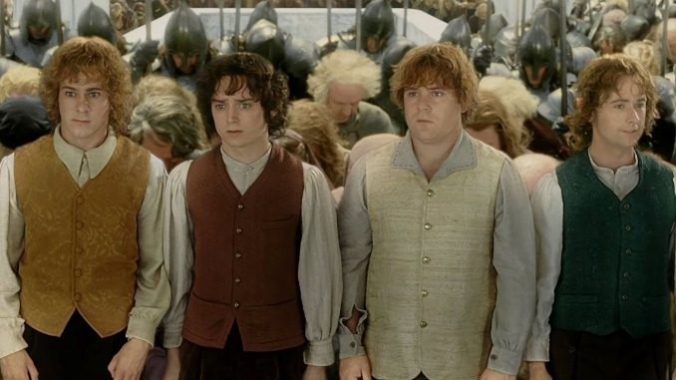The Road Goes Ever On: In Defense of The Return of the King‘s Many Endings, 20 Years Later

There’s a now-famous story about the ending of The Lord of the Rings: The Return of the King that sums up the response to the film just after its debut in December 2003. According to Elijah Wood, Frodo Baggins himself, he was backstage at an awards show just weeks after the film arrived, when he was met by none other than Jack Nicholson, who asked him what happened at the end of the film. Wood, thinking Nicholson was asking for his personal interpretation of Frodo’s final scene, offered his thoughts, only to be interrupted by Jack, who declared that he’d missed all of the character’s goodbyes and gone out to the car before the credits rolled, because the film “just wouldn’t end.”
The Return of the King, of course, went on to win 11 Academy Awards, including Best Picture, sharing the record also held by Ben Hur and Titanic for most wins by a single film. Then as now, it’s considered the crowning achievement of one of the greatest feats of cinematic storytelling in the last 25 years, a moving and invigorating epic in every sense of the word. But if you were around for the film’s reception in 2003, you know that even amid the rapturous celebration, there were jokes about the ending, grumbles that the film just went on too long, tried to do too much with its final scenes. I personally still remember audible groans from the theatrical audience the first time I saw the film, as the screen faded to black on one ending, only to fade back in again to give us another scene, another piece of the massive tapestry that is Peter Jackson’s adaptation of J.R.R. Tolkien’s standard-setting fantasy classic.
Even today, the film hasn’t escaped the “too many endings” reputation, which is puzzling considering the current pop culture climate, in which lore and continuity are prized above all else, especially ambiguity or lingering mystery. Modern franchises are so vast that if the movies aren’t enough plot for you, you’ve got TV shows to fill in the gaps, something that even The Lord of the Rings is not immune to. Pop culture is, broadly speaking, obsessed with stories that tell us everything, so why does The Return of the King still get so much grief?
The answer might be found in its three-hour-plus runtime, or its massive ensemble cast, or even the slow, deliberate way Jackson goes about ending his story, pushing the plot threads well beyond the thrilling climax. Whatever the reason, it’s time to put these complaints to bed. The Return of the King‘s expansive ending is not only the perfect conclusion to this story, but a perfect counterpoint to years of plot-obsessed, continuity-driven storytelling in genre franchises, even if it takes a moment to see it.
To get the heart of why the ending works so well, we first have to think about why the ending (or endings, if you like) takes so long in the first place. Tolkien enthusiasts will tell you that it could have been longer, as Jackson and his cowriters Fran Walsh and Philippa Boyens opted to remove the “Scouring of the Shire” section of the original novel in which Frodo and his friends save their home from unsavory and corrupt influences after the War of the Ring. As thorough as the film’s ending is, Tolkien himself was even more thorough, and threw in not just scenes we don’t see in the film, but a whole Appendices section breaking down the futures of various characters, much of which the film never shows us.
-

-

-

-

-

-

-

-

-

-

-

-

-

-

-

-

-

-

-

-

-

-

-

-

-

-

-

-

-

-

-

-

-

-

-

-

-

-

-

-








































